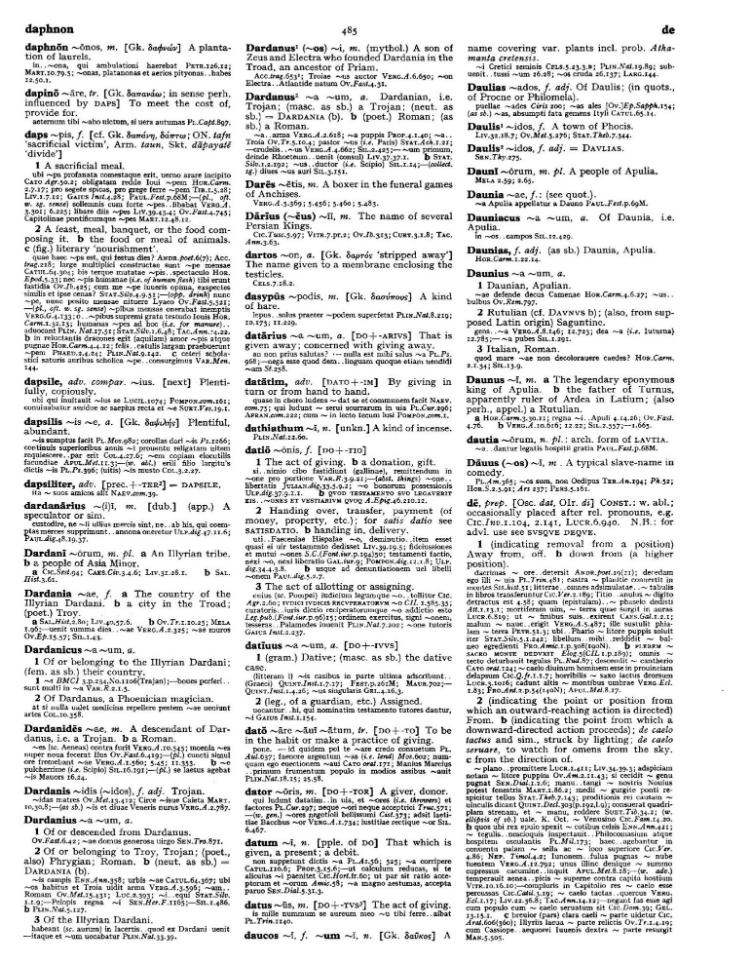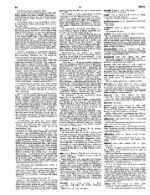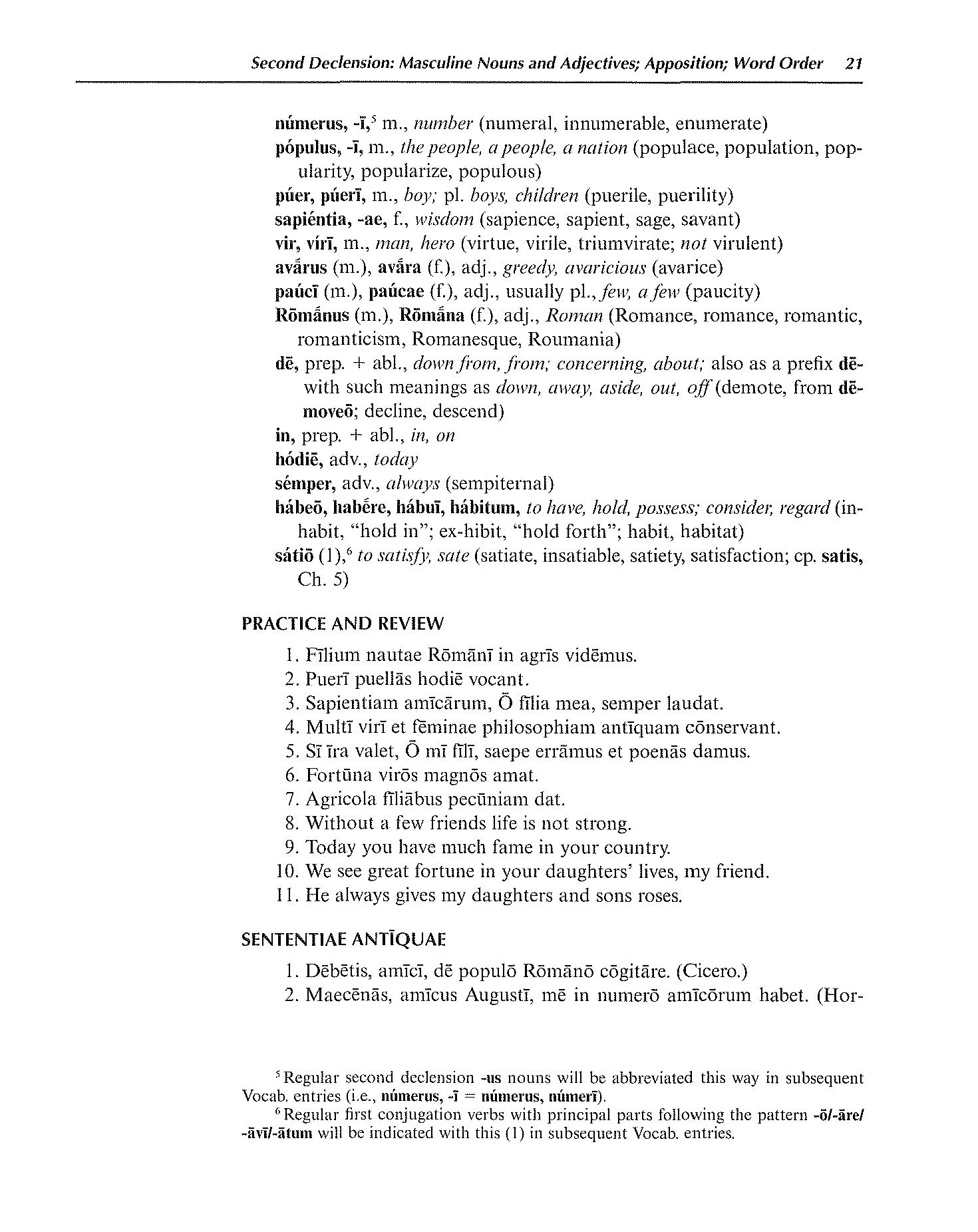
page_listing.tpl
page_subListingDetails.tpl
sub_listingDetails_style1.tpl
sub_listingDetails.title.tpl
dē about
dē is a Latin Preposition that primarily means about.
Definitions for dē
Wheelock's Latin
Preposition
- 1
(prep. + abl.) down from, from; concerning, about
- 2
as a prefix with such meanings as down, away, aside, out, off
English derivatives:
demote decline descend
Oxford Latin Dictionary
Preposition
- 1
(indicating removal from a position) Away from, off. (b) down from (a higher position).
- 2
(indicating the point or position from which an outward-reaching action is directed) From. (b) (indicating the point from which a downward-directed action proceeds); de caelo tactus and sim., struck by lighting; de caelo seruare, to watch for omens from the sky. (c) from the direction of.
- 3
From (a state, situation, etc.).
- 4
Starting with or at (a point of time). (b) immediately after, following; diem de die, day after day.
- 5
(indicating the subject of speech, thought and sim.) About, concerning. (b) (indicating the subject of other actions). (c) indicating the subject of judicial proceedings, an accusation, etc.).
Sentences with dē
Latin to English
Dē amīcō cōgitābō.Compare I shall think about my friend.
Virī dē sē cōgitābant.Compare The men were thinking about themselves.
Librōs dē pāce scrībēmus.Compare We shall write books about peace.
De liberalibus studiis quid sentiam, scire desideras: nullum suspicio, nullum in bonis numero, quod ad aes exit.Compare You have been wishing to know my views with regards to liberal studies. My answer is this: I respect no study, and deem no study good, which results in money-making.
De inimico non loquaris male sed cogites.Compare Don't speak ill of your enemy: plot it.
De ille Alexandria discessus, nihil adhuc rumor.Compare Concerning his departure from Alexandriam there is as yet no rumour.
De hic deus idem fere, qui reliquus gens, habeo opinio.Compare Concerning these gods they have almost the same opinion as other nations.
Data sources
Notes
- Definitions
- Frederick M. Wheelock, Wheelock's Latin, 6th ed., rev. Richard A. LaFleur (New York, NY: HarperCollins Publishers, 2005): 21.
- P. G. W. Glare, Oxford Latin Dictionary, Vols. 1-8 (Oxford: Clarendon Press, 1982): 485.
- Word frequencies
- Christopher Francese, "Latin Core Vocabulary," Dickinson College Commentaries, last modified 2014, http://dcc.dickinson.edu.
- Paul B. Diederich, The Frequency of Latin Words and Their Endings, PhD diss., (Columbia University, 1939).
- Louis Delatte, Suzanne Govaerts, Joseph Denooz, and Etienne Evrard, Dictionnaire fréquentiel et index inverse de la langue latine [Frequency Dictionary and Inverse Index of the Latin Language] (Liège, Belgium: Laboratoire d'analyse statistique des langues anciennes de l'Université de Liège [L.A.S.L.A.], 1981): 119.
Bibliography
Allen, Joseph H. Allen and Greenough's New Latin Grammar for Schools and Colleges: Founded on Comparative Grammar. Edited by James B. Greenough, George L. Kittredge, Albert A. Howard, and Benjamin L. D'Ooge. Boston, MA: Ginn & Company, 1903.
Crystal, David. A Dictionary of Linguistics and Phonetics. 6th ed. Oxford, UK: Blackwell Publishing, 2008.
Delatte, Louis, Suzanne Govaerts, Joseph Denooz, and Etienne Evrard. Dictionnaire fréquentiel et index inverse de la langue latine [Frequency Dictionary and Inverse Index of the Latin Language]. Liège, Belgium: Laboratoire d'analyse statistique des langues anciennes de l'Université de Liège (L.A.S.L.A.), 1981.
Diederich, Paul B. The Frequency of Latin Words and Their Endings. PhD diss., Columbia University, 1939.
Francese, Christopher. "Latin Core Vocabulary." Dickinson College Commentaries. Last modified 2014. http://dcc.dickinson.edu/latin-vocabulary-list.
Gildersleeve, Basil L., and Gonzales Lodge. Gildersleeve's Latin Grammar: Third Edition, Revised, and Enlarged. 3rd ed. London, England: Macmillan and Co., 1903.
Glare, Peter G.W. Oxford Latin Dictionary. Vols. 1-8. Oxford, England: Clarendon Press, 1982.
Krüger, Bernd. "Latin Conjugation Tables." Cactus2000. Accessed May 5, 2023. https://latin.cactus2000.de/index.en.php.
Pierson, Nick. "Sound of Text." Accessed October 26, 2019. https://soundoftext.com.
Wheelock, Frederick M. Wheelock's Latin. 6th ed. Revised by Richard A. LaFleur. New York, NY: HarperCollins Publishers, 2005.
Wiktionary Contributors. "Victionarium." Wikimedia Foundation, Inc. Updated March 18, 2019. https://la.wiktionary.org/wiki/Victionarium:Pagina_prima.
Citation
Chicago (17th ed.)
Allo Contributors. "dē (prep.) - Latin Word Definition." Allo Latin Dictionary. Last modified . Accessed February 20, 2026. http://ancientlanguages.org/latin/dictionary/de.
Entry created on . Last updated on .








